
Evolutionary Intelligence
metrics 2024
Exploring the Synergy of Intelligence Across Disciplines
Introduction
Evolutionary Intelligence is a prestigious journal published by Springer Heidelberg, dedicated to the interdisciplinary study of Artificial Intelligence, Cognitive Neuroscience, Computer Vision, and Mathematics. With its ISSN 1864-5909 and E-ISSN 1864-5917, the journal has established a significant presence in the academic community since its inception in 2008. Spanning a diverse range of topics relevant to both theoretical and empirical research, it has achieved impressive rankings, including Q3 in Artificial Intelligence and Cognitive Neuroscience, and Q2 in Computer Vision and Pattern Recognition as of 2023. With a strong Scopus ranking that places it in the top quartiles of its field, Evolutionary Intelligence serves as an essential platform for scholars and practitioners seeking to advance knowledge and foster innovation in these dynamic fields. Researchers, professionals, and students alike will find invaluable insights and cutting-edge findings that challenge existing paradigms and inspire future explorations in intelligence-related studies.
Metrics 2024
 0.64
0.64 2.30
2.30 2.40
2.40 36
36Metrics History
Rank 2024
Scopus
IF (Web Of Science)
JCI (Web Of Science)
Quartile History
Similar Journals
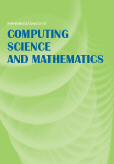
International Journal of Computing Science and Mathematics
Charting New Territories in Computational Theory and PracticeThe International Journal of Computing Science and Mathematics, published by INDERSCIENCE ENTERPRISES LTD, is a pivotal platform for the dissemination of cutting-edge research in the intertwined disciplines of computing science and mathematics. With an ISSN of 1752-5055 and an E-ISSN of 1752-5063, the journal primarily serves the academic community engaged in applied mathematics, computational mathematics, theoretical computer science, and more, making significant contributions that resonate across various fields of technology and science. While the journal is currently categorized in the Q4 quartile for multiple related fields, including Applied Mathematics and Computational Theory, it continues to strive towards advancing the knowledge and practice within these areas. Spanning years from 2007 to 2010 and again from 2012 to 2024, the journal seeks to publish high-quality, peer-reviewed articles that not only address theoretical advancements but also explore practical applications of computing science in mathematical contexts, thereby fostering collaboration among researchers, professionals, and students alike. Please note that this journal is not available as Open Access, thus ensuring a curated content selection intended for dedicated research communities.
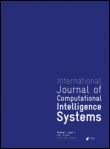
International Journal of Computational Intelligence Systems
Exploring the Frontiers of Computational ResearchInternational Journal of Computational Intelligence Systems, published by SPRINGERNATURE, is a leading open-access journal that has been at the forefront of research in the field of computational intelligence since 2008. With an ISSN of 1875-6891 and an E-ISSN of 1875-6883, this journal occupies a prominent place in the academic landscape, achieving impressive rankings in its categories: Q2 in both Computational Mathematics and Computer Science (miscellaneous), reflecting its significance and relevance to researchers, professionals, and students. Based in Switzerland, the journal is committed to disseminating high-quality research and fostering innovation in computational methodologies, algorithms, and applications. Its strong impact factor and Scopus rankings—31/189 in Computational Mathematics and 53/232 in General Computer Science—underscore its critical role in advancing knowledge in these interdisciplinary fields. As an open-access journal, it provides unparalleled accessibility to cutting-edge research, supporting the global community in staying at the forefront of computational intelligence advancements.

JOURNAL OF COMBINATORIAL OPTIMIZATION
Unlocking the potential of applied mathematics and computational theory.JOURNAL OF COMBINATORIAL OPTIMIZATION, published by Springer, stands at the forefront of research in the fields of applied mathematics, computational theory, and combinatorial optimization. With an ISSN of 1382-6905 and E-ISSN of 1573-2886, this esteemed journal serves as a vital platform for groundbreaking studies and methodologies from 1997 to 2024. Notably positioned in the Q3 quartile across several categories, including applied mathematics and discrete mathematics, it reflects a commitment to high-quality research that pushes the boundaries of knowledge in quantitative analysis and algorithm development. Although it does not offer open access, its visibility and impact are underscored by impressive Scopus rankings, such as the 67th percentile in discrete mathematics and combinatorics. The journal aims to foster a comprehensive understanding of combinatorial optimization and its applications, making it an indispensable resource for researchers, professionals, and students eager to stay abreast of the latest trends and advancements in these dynamic disciplines.
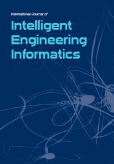
International Journal of Intelligent Engineering Informatics
Shaping Tomorrow's Technologies Through Scholarly Dialogue.International Journal of Intelligent Engineering Informatics, published by INDERSCIENCE ENTERPRISES LTD, stands at the forefront of research in the interdisciplinary domains of computer science, artificial intelligence, and human-computer interaction. With an ISSN of 1758-8715 and E-ISSN of 1758-8723, this journal serves as a vital resource for researchers and professionals seeking to explore the latest advancements in intelligent engineering and informatics techniques crucial for the evolution of modern technologies. Although currently not an open-access publication, it provides a necessary platform for disseminating high-quality research; its impact factor continues to grow, attracting a diverse readership interested in signal processing, software development, and computer vision. Covering innovative topics from 2022 to 2024, the journal is committed to fostering scholarly dialogue that paves the way for emerging trends and applications in the field, ensuring its relevance and significance in today's rapidly advancing technological landscape.
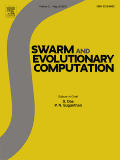
Swarm and Evolutionary Computation
Pioneering Research at the Intersection of Nature and Technology.Swarm and Evolutionary Computation is an esteemed academic journal published by Elsevier, dedicated to the exploration of innovative algorithms and methodologies derived from principles of swarm intelligence and evolutionary computation. With its ISSN 2210-6502 and E-ISSN 2210-6510, this journal has earned a prominent position in the field, evidenced by its Q1 category rankings in both Computer Science and Mathematics for 2023, reflecting its high impact and relevance. The journal's Scopus rankings further underscore its significance, placing it in the top percentile of mathematics and computer science journals. As an open-access platform, it aims to disseminate groundbreaking research that addresses real-world challenges and fosters interdisciplinary collaboration. Researchers, professionals, and students are encouraged to engage with this journal to contribute to and benefit from the ongoing advancements in swarm intelligence and evolutionary methods, which have become instrumental in solving complex optimization problems across diverse fields.

Evolving Systems
Transforming Ideas into Evolving SolutionsEvolving Systems, an esteemed journal published by Springer Heidelberg, focuses on advancing the interdisciplinary field of evolving systems, encompassing areas such as computer science applications, control and optimization, control and systems engineering, and modeling and simulation. Since its inception in 2010, the journal has made significant contributions to the academic community, currently holding a commendable Q2 ranking across multiple categories for the year 2023. With an impactful focus on the dynamic behaviors of systems and their adaptive methodologies, Evolving Systems serves as a crucial platform for researchers, professionals, and students aiming to explore and expand the boundaries of system evolution. Despite being a subscription-based journal, it remains committed to fostering high-quality research dissemination and encourages submissions that push the envelope of knowledge in this rapidly developing field. The journal employs a rigorous peer-review process, ensuring the publication of cutting-edge research that meets the highest scholarly standards.

JOURNAL OF EXPERIMENTAL & THEORETICAL ARTIFICIAL INTELLIGENCE
Catalyzing Discussions in Artificial Intelligence and BeyondThe Journal of Experimental & Theoretical Artificial Intelligence, published by Taylor & Francis Ltd, serves as a premier platform for researchers and professionals interested in advancing the fields of artificial intelligence, software engineering, and theoretical computer science. Established in 1989, this peer-reviewed journal features original research and comprehensive reviews that explore innovative methodologies and emerging trends within these dynamic domains. With an impact factor that reflects its relevance, the journal currently ranks in Q3 across its categories, affirming its contributions to the scholarly community. The journal's commitment to quality and rigor invites submissions that bridge experimental and theoretical frameworks, thus fostering a deeper understanding of AI's applications and implications. Researchers and students can access insightful articles that drive critical discussions and inspire future work, making this journal an essential resource for anyone looking to delve into the complexities of artificial intelligence and its surrounding disciplines.
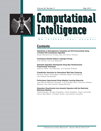
COMPUTATIONAL INTELLIGENCE
Driving Innovation in AI and Computational MathematicsCOMPUTATIONAL INTELLIGENCE is a prestigious, peer-reviewed journal published by Wiley, dedicated to advancing the field of artificial intelligence and computational mathematics since its inception in 1985. With an impressive track record reflected in its Q2 ranking in both the Artificial Intelligence and Computational Mathematics categories for 2023, this journal is a leading resource for researchers, professionals, and students seeking to explore cutting-edge methodologies, theories, and applications that underpin computational intelligence. The journal is indexed in Scopus, holding a remarkable rank of 18/189 in Computational Mathematics, placing it in the top 10% of its field, and ranks 111/350 in Artificial Intelligence. Although it does not offer open access, articles are readily accessible for institutions, ensuring a wide outreach within the academic community. With its commitment to fostering innovation and critical thought, COMPUTATIONAL INTELLIGENCE continues to be an essential platform for disseminating high-quality research that shapes the future of technology and mathematics.
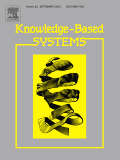
KNOWLEDGE-BASED SYSTEMS
Exploring Innovations in Artificial Intelligence and Decision SciencesKNOWLEDGE-BASED SYSTEMS, published by ELSEVIER, is a leading international journal that has established itself as a cornerstone in the fields of Artificial Intelligence, Information Systems and Management, and Software Development. With an impressive track record of over 35 years in publication, this journal is highly regarded for its significant contributions to the understanding and advancement of intelligent systems, providing a platform for innovative research and applications. It boasts a strong impact factor, maintaining a Q1 ranking across multiple categories, including Management Information Systems and Decision Sciences, reflecting its prestige and relevance in the academic community. Researchers and practitioners alike benefit from access to high-quality, peer-reviewed articles that explore the intersection of knowledge management and transformative technologies. The journal's commitment to fostering interdisciplinary research encourages the dissemination of knowledge that shapes the future of intelligent decision-making processes. With a substantial audience that includes professionals, academics, and students, KNOWLEDGE-BASED SYSTEMS continues to be a vital resource for those at the frontier of technological advancement.

SOFT COMPUTING
Exploring the Frontiers of Soft ComputingSOFT COMPUTING is a premier international journal published by Springer, focusing on the interdisciplinary field of soft computing, which includes areas such as fuzzy logic, neural networks, genetic algorithms, and their applications. With an ISSN of 1432-7643 and E-ISSN 1433-7479, the journal is based in Germany and contributes significantly to the advancement of knowledge in its fields, boasting an impressive Scopus ranking that places it in the top echelons of Geometry and Topology, Theoretical Computer Science, and Software categories. In the 2023 category quartiles, it has achieved Q2 rankings in multiple disciplines, reflecting its high-quality research contributions. Though not Open Access, the journal's rigor and relevance to contemporary issues make it a favored resource for researchers, professionals, and students alike. From its inception in 2000 and spanning across the years until 2024, SOFT COMPUTING continues to serve as a robust platform for innovative research and theoretical advancements, making it an essential read for anyone engaged in the rapidly evolving landscape of computational intelligence.